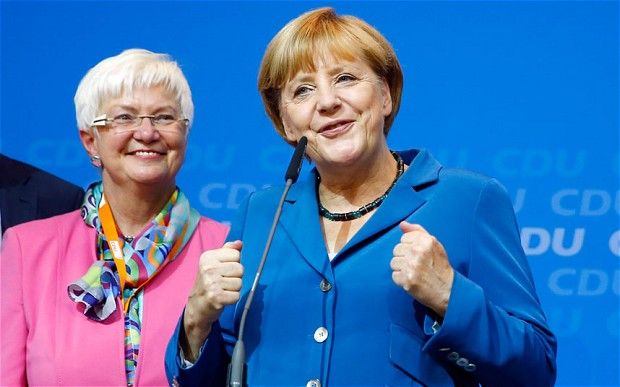 Angela Merkel gives a speech after the first exit polls Photo: Reuters
Angela Merkel gives a speech after the first exit polls Photo: Reuters
The day after her stunning election triumph, German Chancellor Angela Merkel was on Monday set to start the process of haggling with potential partners over how to rule Europe's biggest economy.
After a campaign that banked on Merkel's image as a calm, sensible and reassuring eurozone crisis manager, she led her conservative Christian Democratic Union (CDU) close to its first absolute majority in half a century.
"The Merkel Republic," ran the headline for a commentary on news site Spiegel Online, which declared that after the landslide outcome which won the chancellor a third term, "Germany has finally become Angela Merkel-Land".
True to her style, Merkel pledged that "we will use the result responsibly and carefully," but stressed that she intends to serve out her full term till 2017, as jubilant supporters yelled "Angie, Angie, Angie".
The CDU and its Bavarian allies demolished their centre-left opponents with what a beaming Merkel called a "super-result" of 41.5 per cent, its best in 23 years.
However, the shock demise of Merkel's junior allies the pro-business Free Democrats (FDP) after more than half a century in parliament meant she now has to look for a new coalition partner.
The most likely candidate was the centre-left Social Democrats (SPD), who scored just under 26 per cent. Its candidate Peer Steinbrueck said late Sunday that "the ball is in Merkel's court. She has to put together a majority."
An outside option would be a Merkel coalition with the ecologist and left-leaning Greens, who won 8.4 per cent, although both parties in the campaign nixed such an uneasy alliance given their yawning policy differences
Cautious and guarded as ever, Merkel said late Sunday she would wait for the final numbers and than proceed "step-by-step".
"We won't start a va-banque game", she said, using a gambling reference to a highly risky endeavour.
Merkel herself said that – after other parties were bruised in previous coalitions with her – "perhaps we'll no longer find anyone who wants to get together with us".
Either way, observers expected days or even weeks of tough negotiations over policies and ministry posts between potential partners.
Whatever shape the new government will take, the impact on the eurozone and the rest of the world was judged to be marginal by commentators.
Looking at a left-right grand coalition scenario, Berenberg Bank analyst Holger Schmieding said broadly "the SPD endorses Merkel's euro policies", including opposition to Eurobonds.
Because the SPD campaigned on social justice issues and help for the working poor, it would be expected to want to soften some of its own tough labour reforms from a decade ago and demand a national minimum wage.
The parties would probably agree on a minor stimulus through infrastructure spending, a modest hike in top marginal income taxes and a gradual reduction in subsidies for solar and wind energy, said the Berenberg Bank note.
Teaming up with the SPD, as Merkel did 2005-09, would make it easier for her to push policy through the upper house representing Germany's 16 states, where the opposition "red-green" alliance has a majority.
Newcomers the eurosceptic party AfD missed out narrowly on entering parliament, coming in just under the five-percent threshold to gain seats.
The big losers of the evening, Merkel's junior partners the FDP, crashed out for the first time since 1949, having plunged some 10 points since the last election amid ugly party infighting.
Vice Chancellor Philipp Roesler called it "the most bitter and sad hour" of his party, which also includes outgoing foreign minister Guido Westerwelle, and which was headed for deep soul-searching and a likely decapitation of its leadership.
The small party's loss was the CDU's gain, boosting its relative strength when it comes to dividing up parliamentary seats.
Ironically, the conservatives gained fewer votes than the combined left – the SPD, Greens and far-left Linke, which won 8.6 per cent.
However the Linke, successor to East German communists, has consistently been rejected by the SPD and Greens as a coalition partner.
 В Атырау -10
В Атырау -10